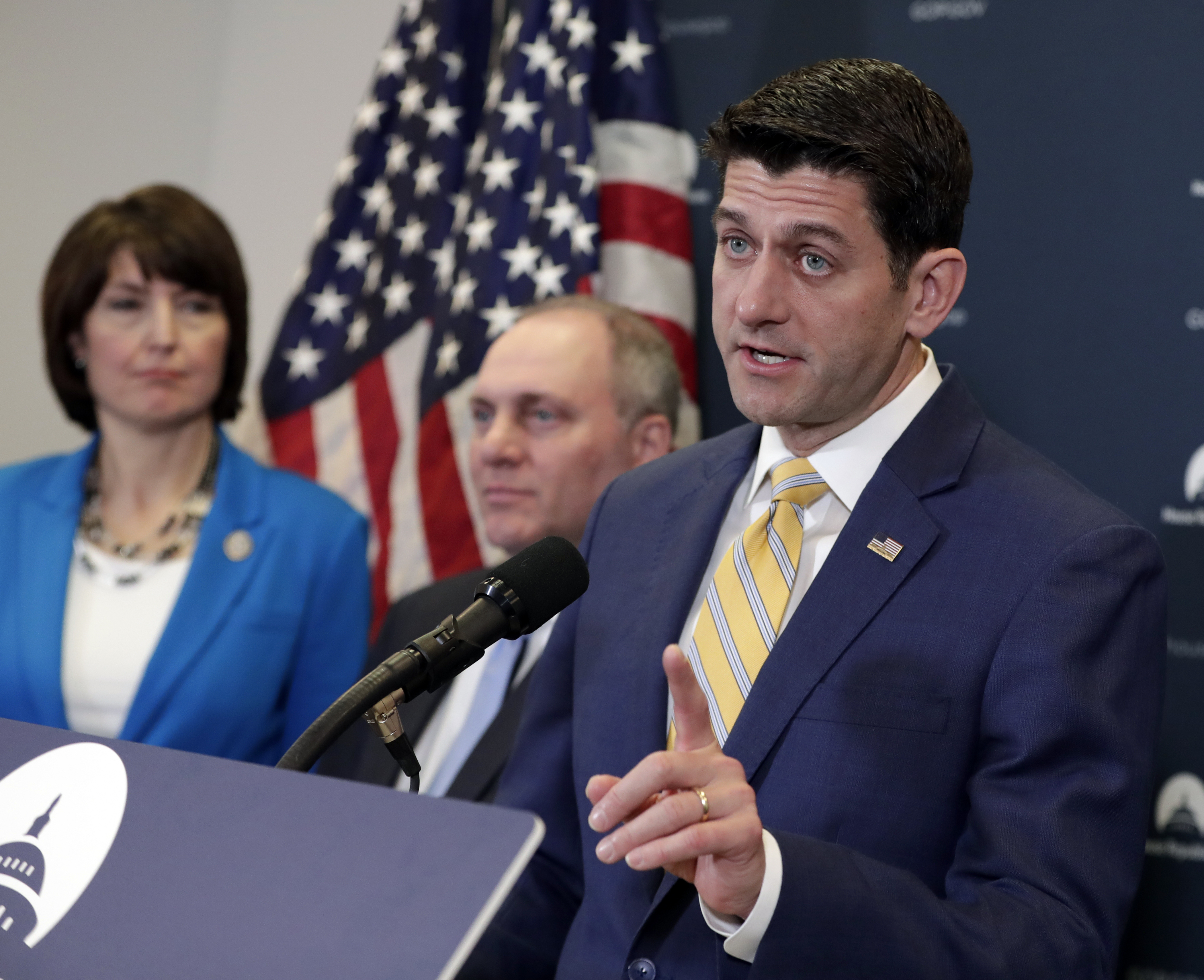Why is the GOP growing a spine over steel?
The GOP enables so much Trumpian awfulness. But they'll stand up to him over tariffs?!


A free daily email with the biggest news stories of the day – and the best features from TheWeek.com
You are now subscribed
Your newsletter sign-up was successful
Washington's latest tempest in a teapot, in which doctrinaire Republicans spar with President Trump over tariffs, lays bare the essential amorality of the party's transactional alliance with Trump — and the rank bad faith in which both sides engage with the rest of the country.
The party has enabled so much Trumpian awfulness. But they'll stand up to him over tariffs?!
It's impossible to pinpoint exactly when the GOP became the malignancy that it is today. But it's fairly easy to draw a straight line from the nomination of Sarah Palin for vice president to the present moment. The cynical and desperate selection of Palin in the summer of 2008, and the subsequent lionization of her on the populist right, was the first unmistakable sign that conservatism had been reduced to one gigantic irritable mental gesture.
The Week
Escape your echo chamber. Get the facts behind the news, plus analysis from multiple perspectives.

Sign up for The Week's Free Newsletters
From our morning news briefing to a weekly Good News Newsletter, get the best of The Week delivered directly to your inbox.
From our morning news briefing to a weekly Good News Newsletter, get the best of The Week delivered directly to your inbox.
The party has been punished exactly once — in the form of President Obama's 2012 re-election — since that moment.
For their remorseless opposition to fiscal stimulus during the worst economic crisis in half a century, and then to the concept of universal health care, the party was rewarded in 2010 with a triumphant takeover of the House of Representatives. How's the "Tea Party revolution" looking today as Republicans, with their unified control of the federal government, have ditched the anti-Obama cudgel that was budget sequestration and (again) embraced deficits as far as the eye can see?
About as silly as a suburban rabble-rouser in a tricorn hat.
After the temporary comeuppance of the 2012 election, in which the GOP nominated a transparently phony, conviction-free opportunist, the party's first order of business was to resist (with the help, it must be said, of four red state Democrats) a milquetoast response to the Sandy Hook Elementary School massacre. Later it would petulantly shut down the government for nearly two weeks to stop the implementation of the Affordable Care Act. It also refused to even consider a nominee for the U.S. Supreme Court — a bold, unprecedented, norm-traducing act of partisan defiance.
A free daily email with the biggest news stories of the day – and the best features from TheWeek.com
For these and other feats of statesmanship, the party was rewarded with control of the U.S. Senate.
The 2016 election cycle was supposed to be something of a definitive verdict. Donald Trump, who had swatted away what had been considered the best and brightest of the party's center-right faction, became the avatar of a dying demographic of resentful, reactionary white voters. His almost-certain defeat was going to send a message to an intractable party: Adapt or die.
Instead the party was rewarded with the presidency, complete control of the federal government, and, for good measure, a stolen seat on the Supreme Court.
Maybe this year will be different. Maybe it will prove a disruption in this vicious cycle of partisan impunity. Or maybe not. In the meantime let us enjoy this inning of intra-party dispute.
Republicans will look the other way as Trump monetizes the presidency and fleeces taxpayers by blurring the lines of the office and his privately held business. They will plug their eyes and cover their eyes in the face of mounting evidence that he or his campaign underlings engaged in a conspiracy with foreign espionage agents. They will overlook hush money payments to porn stars. They will tolerate nepotism. They will validate unconscionable treatment of Justice Department officials. But the imposition of tariffs on steel and aluminum is apparently a red line the crossing of which will awaken the sleeping giant of principled conservatism!
This kerfuffle, too, will eventually fade from view as a new one takes its place. But until the electorate finally rouses itself to discipline these impervious characters, we must content ourselves with the schadenfreude on offer in this chapter of the drama.
As I say: Savor it!
Scott Galupo is a freelance writer living in Virginia. In addition to The Week, he blogs for U.S. News and reviews live music for The Washington Post. He was formerly a senior contributor to the American Conservative and staff writer for The Washington Times. He was also an aide to Rep. John Boehner. He lives with his wife and two children and writes about politics to support his guitar habit.
-
 Film reviews: ‘Send Help’ and ‘Private Life’
Film reviews: ‘Send Help’ and ‘Private Life’Feature An office doormat is stranded alone with her awful boss and a frazzled therapist turns amateur murder investigator
-
 Movies to watch in February
Movies to watch in Februarythe week recommends Time travelers, multiverse hoppers and an Iraqi parable highlight this month’s offerings during the deep of winter
-
 ICE’s facial scanning is the tip of the surveillance iceberg
ICE’s facial scanning is the tip of the surveillance icebergIN THE SPOTLIGHT Federal troops are increasingly turning to high-tech tracking tools that push the boundaries of personal privacy
-
 The billionaires’ wealth tax: a catastrophe for California?
The billionaires’ wealth tax: a catastrophe for California?Talking Point Peter Thiel and Larry Page preparing to change state residency
-
 Bari Weiss’ ‘60 Minutes’ scandal is about more than one report
Bari Weiss’ ‘60 Minutes’ scandal is about more than one reportIN THE SPOTLIGHT By blocking an approved segment on a controversial prison holding US deportees in El Salvador, the editor-in-chief of CBS News has become the main story
-
 Has Zohran Mamdani shown the Democrats how to win again?
Has Zohran Mamdani shown the Democrats how to win again?Today’s Big Question New York City mayoral election touted as victory for left-wing populists but moderate centrist wins elsewhere present more complex path for Democratic Party
-
 Millions turn out for anti-Trump ‘No Kings’ rallies
Millions turn out for anti-Trump ‘No Kings’ ralliesSpeed Read An estimated 7 million people participated, 2 million more than at the first ‘No Kings’ protest in June
-
 Ghislaine Maxwell: angling for a Trump pardon
Ghislaine Maxwell: angling for a Trump pardonTalking Point Convicted sex trafficker's testimony could shed new light on president's links to Jeffrey Epstein
-
 The last words and final moments of 40 presidents
The last words and final moments of 40 presidentsThe Explainer Some are eloquent quotes worthy of the holders of the highest office in the nation, and others... aren't
-
 The JFK files: the truth at last?
The JFK files: the truth at last?In The Spotlight More than 64,000 previously classified documents relating the 1963 assassination of John F. Kennedy have been released by the Trump administration
-
 'Seriously, not literally': how should the world take Donald Trump?
'Seriously, not literally': how should the world take Donald Trump?Today's big question White House rhetoric and reality look likely to become increasingly blurred
